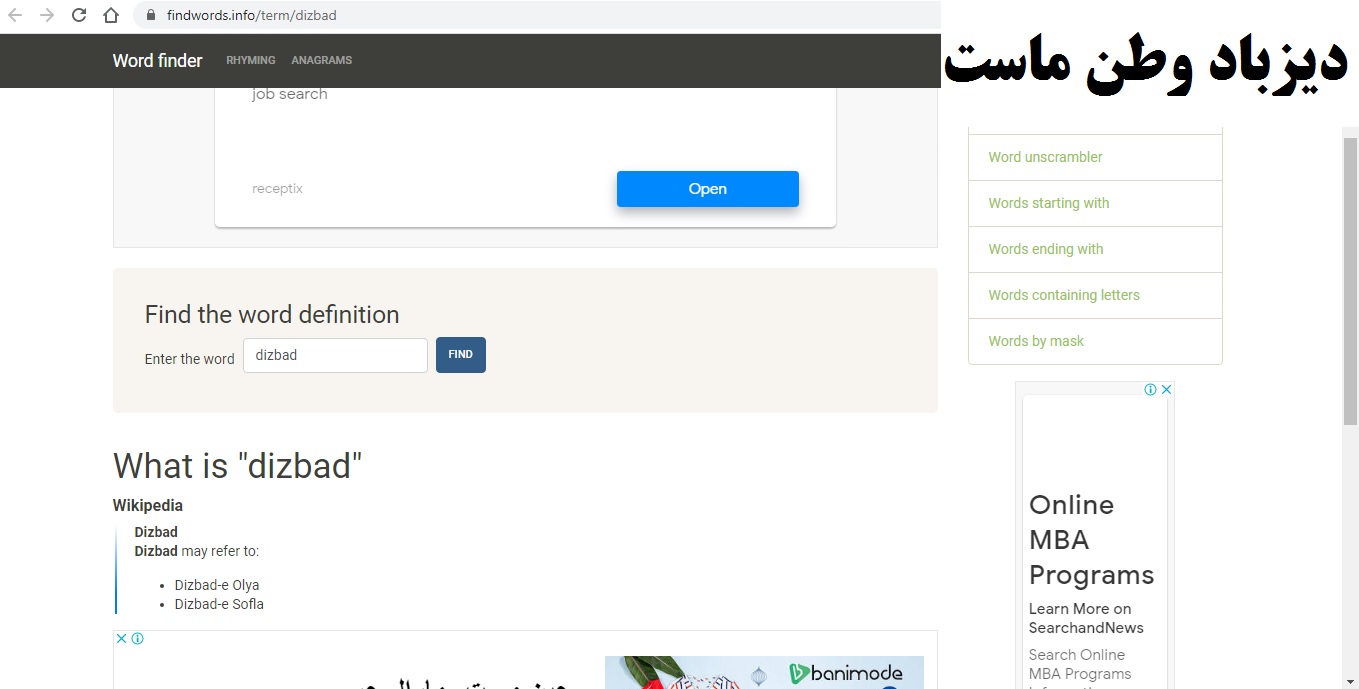
دیزباد وطن ماست
سایت رسمی روستای دیزباد علیا (بالا) از توابع شهرستان نیشابور در استان خراسان رضوی ایران.
دیزباد وطن ماست
سایت رسمی روستای دیزباد علیا (بالا) از توابع شهرستان نیشابور در استان خراسان رضوی ایران.Case Study: Villages of Dizbad-e-Bala, Frizi, and Aydalik
ِDizbad Watane Mast: An Analysis of Effective Physical-Spatial Elements in Rural Housing (Case Study: Villages of Dizbad-e-Bala, Frizi, and Aydalik) has written by: Abasalt Askari Ranbari, Shahab Abbaszadeh, Ali Asghar Abroon and published in 2016/3/1.
You can find this article in the Journal of Research and Rural Planning, Volume: 4, Number: 4 and 177-193 Pages.
Published in: Ferdowsi University of Mashhad Presss
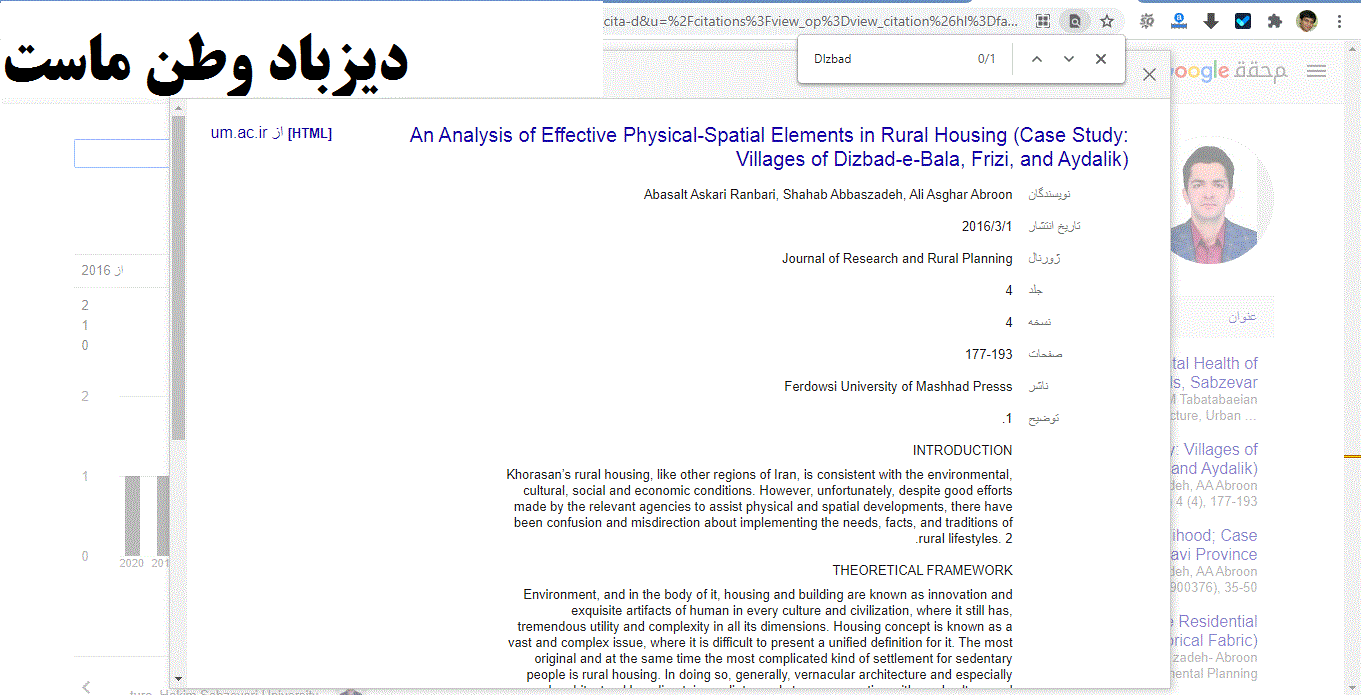
Abstract:
1. INTRODUCTION
Khorasan’s rural housing, like other regions of Iran, is consistent with the environmental, cultural, social and economic conditions. However, unfortunately, despite good efforts made by the relevant agencies to assist physical and spatial developments, there have been confusion and misdirection about implementing the needs, facts, and traditions of rural lifestyles. 2.
THEORETICAL FRAMEWORK
Environment, and in the body of it, housing and building are known as innovation and exquisite artifacts of human in every culture and civilization, where it still has, tremendous utility and complexity in all its dimensions. Housing concept is known as a vast and complex issue, where it is difficult to present a unified definition for it. The most original and at the same time the most complicated kind of settlement for sedentary people is rural housing. In doing so, generally, vernacular architecture and especially rural architectural has direct, immediate, and strong connection with rural culture and everyday activity in villages. Rural housing is known as a multifaceted and sophisticated phenomenon, from this point of view. Rural housing is more than a shelter and plays the role of not only a resort, but it also has a generative and livelihood role like a warehouse and workshop in rural areas. Compatibility between house and natural environment, villagers’ smart utilization of vernacular and accessible materials for housing, immediate and direct connection with the culture and everyday life of people, and being influenced by social norms like contentment, are the most important characteristics of this type of rural architecture. With the aim of …
Case Study: The Tourist Destination Village of Dizbad Olya
Dizbad Watane Mast: The Key Propellants Affecting Rural Tourism Development (Case Study: The Tourist Destination Village of Dizbad Olya) is the name of a Document Type which has written by: Farah Fathizadeh 1 Farhad Azizpour 1 Nader Sanati Sharghi 2 in the Kharazmi University and Payame Noor University, Tehran. you can find the full text article in bellow link:
Abstract
Introduction
Today, tourism has become one of the most rapidly growing industries in the world that plays an influential role in sustainable development. Rural areas have always been in the center of sustainable development. Planners in this field also seek a secure framework to develop the tourism industry in different rural regions and gain a correct understanding of futuristic and effective strategies in line with the growth of the industry. One of the ways to identify and evaluate the status of tourism is the use of foresight approach. For many years, tourism development planning in Iran has been devoid of such futuristic analyses. In the majority of studies, rural tourism fields have been regarded as unsustainable areas with weak economy and a lack of specific policymaking. Accordingly, there are major challenges with respect to the rural environment, economy, and community; challenges that can also be traced in processes of planning and implementation present in Khorasan Razavi planning records. Having more than 57 tourist destination rural areas in different regions, this province has a special potential to raise incomes generated from this field. Subsequently, the present study was conducted on Dizbad tourist destination village located in the Eastern Zebarkhan section of Khorasan Razavi province to provide answers to the following question: What are the key propellants affecting rural tourism development in Dizbad?
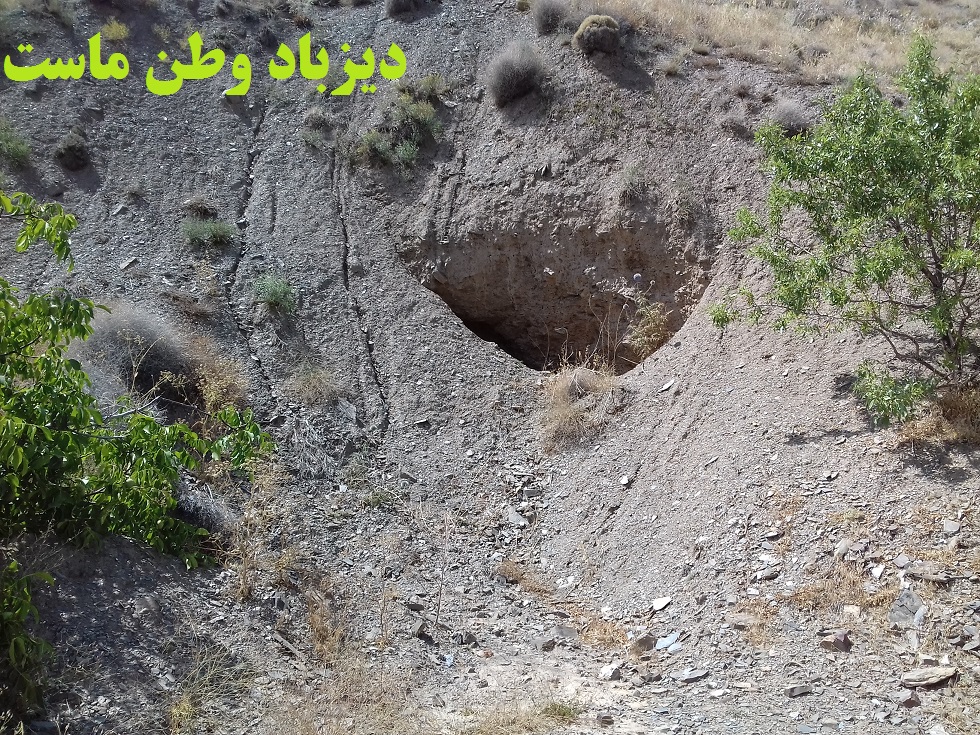
2. Review of Literature
Rural tourism and its development process refers to any event or process through which a considerable population from surrounding areas or outside the region would relocate and move to observe and enjoy historical, cultural, economic, and untouched natural attractions, while their presences can generate a suitable amount of income for locals and residents. The importance of this industry in rural areas are very significant, to the extent to which the decline in traditional rural industries such as agriculture, mining, and forestry during the past three decades have led rural communities to seek alternatives so as to strengthen their own economic bases. One alternative in this respect is tourism (Sajjadi and Ahmadi, 2013).
Kadiver (2017) identified 59 rural fields with tourism capabilities in Khorasan Razavi in the form of tourism products and demand markets using MS-SWOT. He concluded that the investigated rural areas involve maximum attractions and at the same time, maximum structural deficiencies which required modifying invasive strategies in this context for their mitigation.
In another study titled, Karami Dehkordi, Mirakzadeh, and Ghiyasvand Ghiyasi (2015) showed that seven factors including governmental planning, participation, culture and society, economy, health and environment, security, and promotion and utility explain 72.04% of the variance in effective factors on tourism development in the province.
Method
The present, descriptive-analytical study was conducted using documents-library studies, field observations, questionnaires designed under the Delphi model, and cross impact analysis matrix in MicMac foresight software. To this end, 20 individuals were selected among the scientific and executive experts who had sufficient knowledge on the subject of the study and the tourist area of Dizbad Olya as the sample population using non-random purposive sampling. In the first step, studies conducted in this area were used to collect variables. Next, 20 questionnaires were distributed among the sample population who were asked to rate variables from a score of 0 to 3 based on their effectiveness under the cross impact analysis matrix (a 20x20 matrix was drawn in this regard). In this rating system, scores of 0, 1, 2, and 3 respectively showed “no impact”, “low impact”, “average impact”, and “high impact”. The letter “P” was used to denote potentially direct and indirect effectiveness. Then, ratings were placed inside the cross matrix. The MicMac software was used to evaluate the effectiveness (direct and indirect) of each variable and their subordinate variables with other factors; ultimately, the required output charts were obtained by specifying the key propellant forces.
ادامه مطلب ...
Tectonic and Stratigraphic Features of "Dizbad Bala" Area
Dizbad Watane Mast: A Review of Tectonic and Stratigraphic Features of "Dizbad Bala" Area, Binalood city With Emphasis on Fossil Rock Outcrop and Metamorphism has done by Moslem Yazdani and Published in 2016.
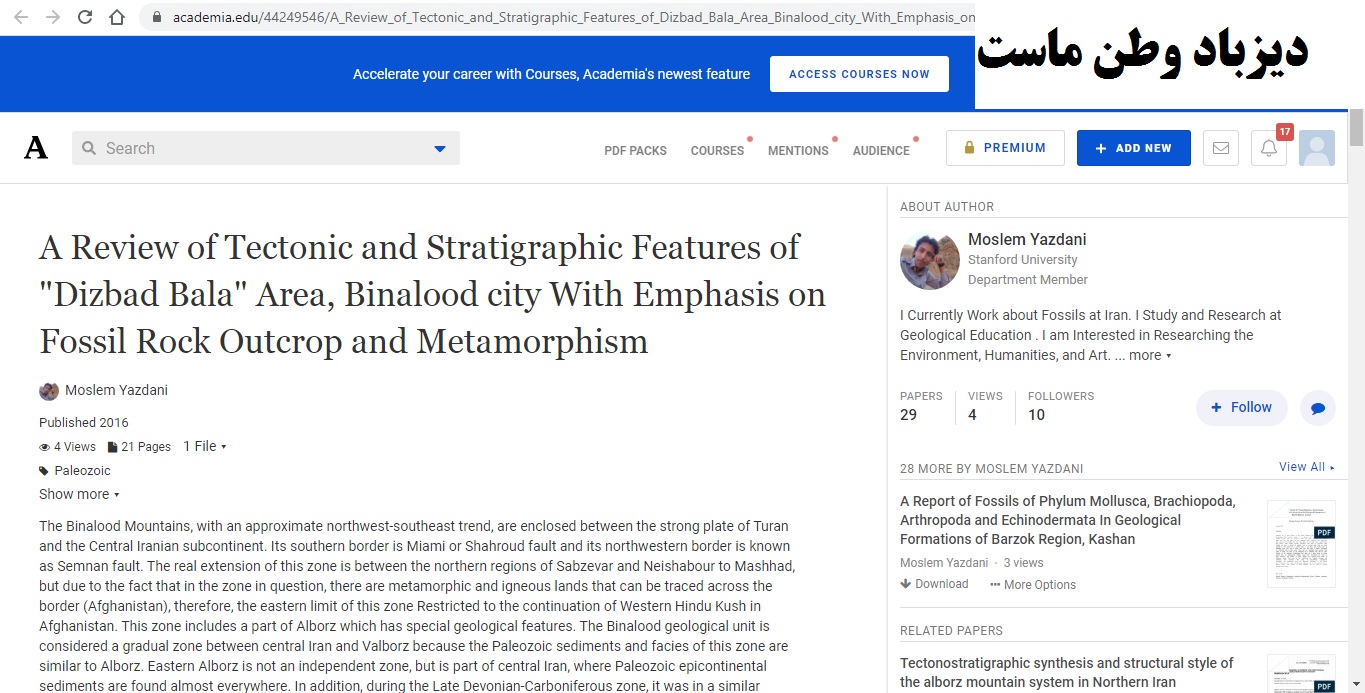
you can find the original page with full article in bellow link:
The Binalood Mountains, with an approximate northwest-southeast trend, are enclosed between the strong plate of Turan and the Central Iranian subcontinent. Its southern border is Miami or Shahroud fault and its northwestern border is known as Semnan fault. The real extension of this zone is between the northern regions of Sabzevar and Neishabour to Mashhad, but due to the fact that in the zone in question, there are metamorphic and igneous lands that can be traced across the border (Afghanistan), therefore, the eastern limit of this zone Restricted to the continuation of Western Hindu Kush in Afghanistan. This zone includes a part of Alborz which has special geological features. The Binalood geological unit is considered a gradual zone between central Iran and Valborz because the Paleozoic sediments and facies of this zone are similar to Alborz. Eastern Alborz is not an independent zone, but is part of central Iran, where Paleozoic epicontinental sediments are found almost everywhere. In addition, during the Late Devonian-Carboniferous zone, it was in a similar situation with the western and central Alborz and in the Permian with other parts of Iran in terms of sedimentary basin. The igneous and metamorphic complex of this zone, which is especially protruding in the south and west of Mashhad, includes three phases of regional metamorphism and two stages of granitization, and there are also ultrabasic masses. The metamorphic and granitic phases of Binalood during the Hersinian orogenic period and later in the Middle Triassic have been totally affected by the Early Cimmerian metamorphism. Continuation of part of the Hersinian orogenic function that reaches south of Mashhad from Tiashan-Pamir-Hindu Kush is the subduction type of oceanic crust. There were fossilized Cambrian sediments in this zone and during the Lower Silurian and Lower Devonian, a common sea covered northeastern Iran and central Iran. Because similar sediments have been left during this period in Binalood and Central Iran. This connection to the lower Carboniferous also existed, while in Alborz this connection was completely cut off. This condition is attributed to the Late Devonian terrestrial movements and is attributed to the lower Carboniferous basal conglomerates. Upper Carboniferous sediments in Binalood include a collection of black and shale quartzite sandstones that are somewhat similar to the Sardar Formation (Tabas - Central Iran).
دیزباد سر از سایت هواشناسی فرانسوی lachainemeteo در آورد
«دیزباد وطن ماست»- سایت فرانسوی هواشناسی lachainemeteo یکی از سایت های معتبر هواشناسی است که در آن می توانید آب و هوای لحظه ای دیزباد را ملاحظه فرمایید.
به گزارش دیزباد وطن ماست، در سال های اخیر سایت های هواشناسی زیادی نام دیزباد را در فهرست خود ثبت کرده اند و اکنون دیزبادی ها در بیشتر زبان ها این امکان را دارند که آب و هوای دیزباد را ملاحظه نمایند.
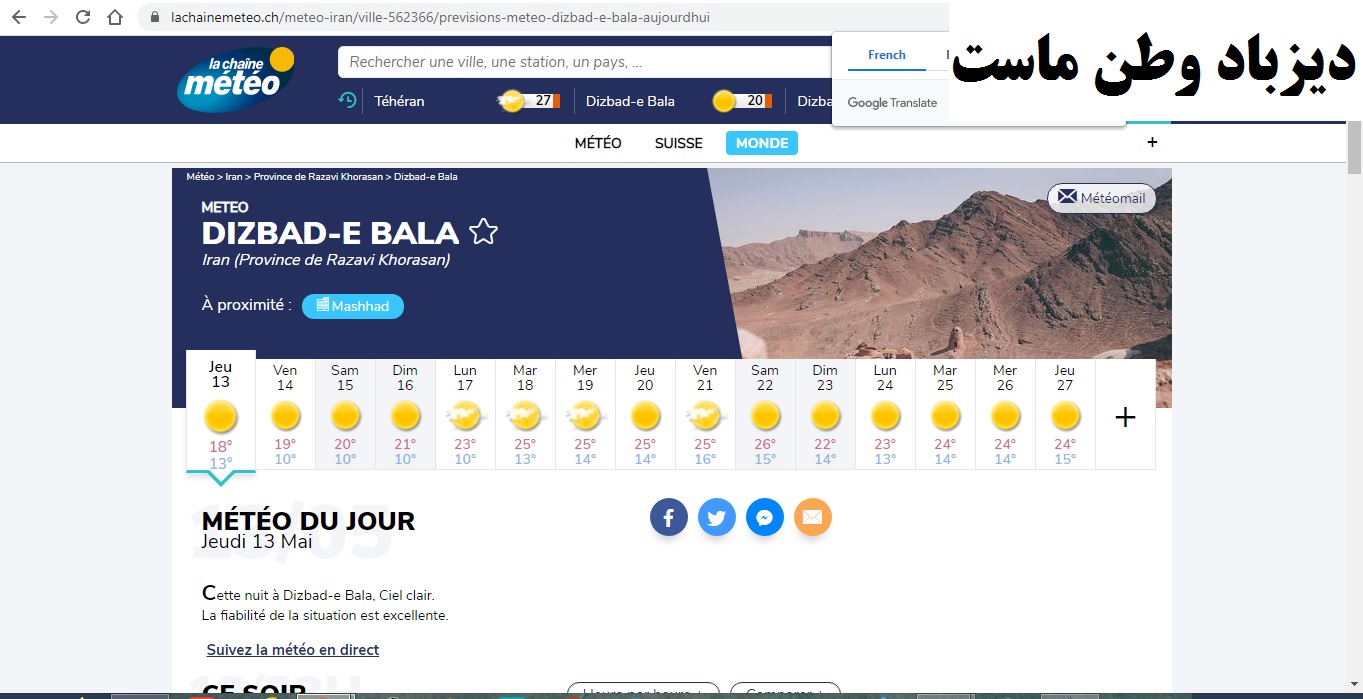
دیزباد بدون اطلاعات در سایت Find Word
«دیزباد وطن ماست»- سایت فایند ورد به نوعی یک دیکشنری است که در مورد هر کلمه اطلاعات مورد نیاز مخاطبان را در اختیار آنها قرار می دهد.
دو واژه دیزباد علیا و دیزباد بالا به زبان انگلیسی در این سایت قرار گرفته است اما هنوز صفحه برای این دو واژه بهینه نشده است.
امیدواریم که علاقه مندان و صاحبنظرات در این صفحات اطلاعات کافی را در باره دیزباد قرار دهند. دیزباد وطن ماست منبعی است که می توانید از آن برای تکمیل داده ها در ویکی ها استفاده کنید.
